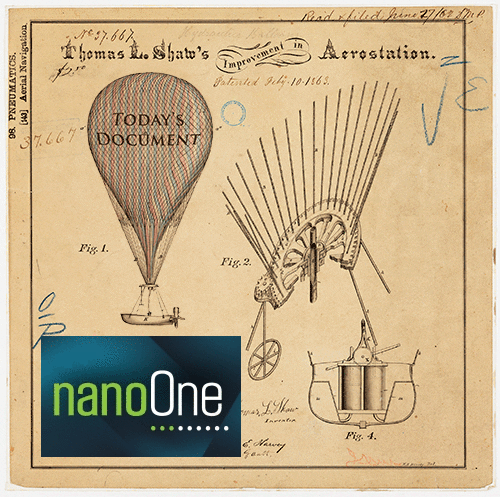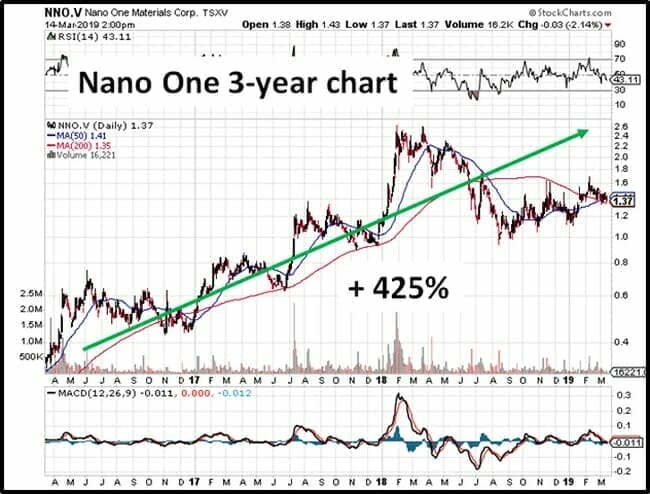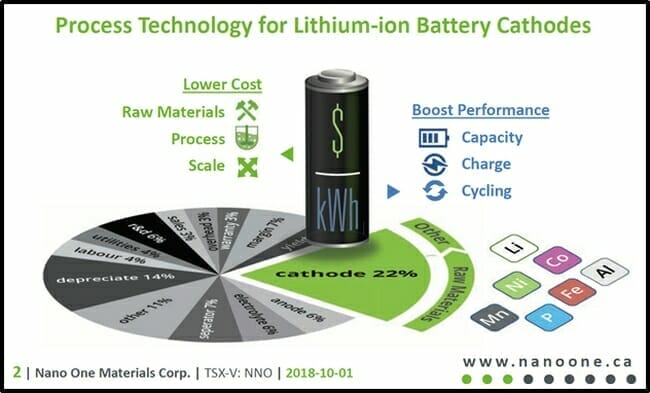On March 14, 2019 Nano One (NNO.V) announced the issuance of Canadian Patent# 2,905,984.
This is Nano One’s 3rd patent in Canada bringing the total now to 12 patents issued around the globe.
Nano One has developed proprietary technology to build a better and cheaper battery. Its scaled process can make cathode materials using the cheaper lithium carbonate in place of the more expensive lithium hydroxide.
We’ve been covering NNO since Albert Einstein discovered the photoelectric effect, riding it from .32 to a March 2018 to high of $2.53, and down to the current price of $1.37.
During that time, we wrote about 35 articles on NNO including: locking down IP, partnering, CEO podcasts, collaborators, wealth creation, innovation, Chinese delegation, technology moats etc.
Last summer, the CEO, Dan Blondal took us on video tour of his pilot factory – explaining strategic partnerships and the goals of the company.
Recently, the subject of NNO’s patents has been dominating the news flow:
Nano One (NNO.V) registers a battery patent in China
Nano One (NNO.V) gets 10th patent
Nano One’s (NNO.V) secures Canadian patent for battery powder
Retail investors often perceive patents as boring obligatory corporate paperwork.
It’s true, navigating a patent website does not quickly reveal fascinating and original inventions. 99% of registered patents are incremental improvements to existing products.
For context, NNO’s latest Canadian patent (2,905,984) is book-ended by Patent# 2,905,983 – an Alternating Paddle Mechanism for Pool Cleaner, and Patent# 2,905,985 – an Expandable & Rotatable Power Strip.
For NNO shareholders, the patents protect and expand the value of the company.
On January 21, 2019, NNO announced that it has entered into a J.V. with Pulead Technology Industry – a Chinese cathode producer to “develop, evaluate and optimize scaled up production of lithium iron phosphate (LFP) cathode materials.”
Pulead is one of China’s leading Li-ion battery cathode producers, with JVs in cathodes, separators, upstream lithium resources and large format battery packs.
China’s interest Electric Vehicles is rooted in financial pragmatism.
Researchers from Berkeley Earth estimate that 1.6 million Chinese die every year from pollution-related health issues. The annual economic cost is about $700 billion – from medical expenses, hospitalisation and lost productivity.
China’s President Xi Jinping recently stated: “China will make efforts to streamline access to markets in the areas of investment and intellectual property.”
On cue, a month ago, NNO announced that it has registered patent ZL2014800279145 in China.
NNO’s Chief Technology Officer (CTO) Dr. Campbell joined Nano One in September 2015 after holding key roles in Automotive Fuel Cell Cooperation and Ballard Power Systems.
Possessing a Ph.D. in Semiconductor Electrochemistry – Campbell also has expertise in project management, negotiation, government relationships and IP development.
“This latest Canadian patent is significant to Nano One,” stated Campbell, “because it is related to the formation of lithium ion battery precursors by the novel process developed at Nano One.”
Precursors are intermediate mixtures of metals such as nickel, cobalt and manganese prepared in advance of high temperature processing in a furnace.
Nano One’s patented process:
- adds lithium to the precursors in an intimate mixture
- avoids the need to grind and mill
- shorten thermal process times
- simplify manufacturing
- enable alternative feedstocks
Registering domestic and international patents is a highly specialised skill.
Inventions that are defined too narrowly allow competitors to devise workarounds
Inventions that are defined too broadly can be easily challenged.
Nano One has further strengthened its patent knowledge base with the addition of Dr. Joseph T. Guy, to the NNO board.
Guy works for Emergent Law Firm which operates in the areas of corporate, employment, litigation, and intellectual property law. Holding a PHD in chemistry, he has more than 23 years experience prosecuting patents and serving as expert witness on IP matters.
“Nano One began filing patents 5 years ago and continues to innovate,” explained Guy, “Those efforts are turning into a world-class patent estate which positions Nano One favorably as it engages with global leaders in lithium ion batteries and materials.”
According to Wise Guy Reports, the 2017 worldwide lithium-ion cathode market was about $5.1 billion – and is expected to reach $58.8 billion by 2024.
Nano One continues to extend its patent coverage on a global scale, with patents now issued in Canada, United States, China, Korea, Taiwan and Japan.
Full Disclosure: Nano One is an Equity Guru marketing client, and we own the stock.



